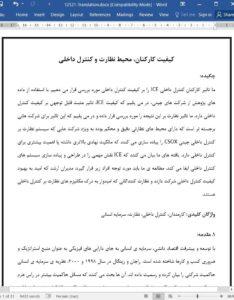Abstract
We investigate the effect of internal control employees (ICEs) on internal control quality. Using special survey data from Chinese listed firms, we find that ICE quality has a significant positive influence on internal control quality. We examine the effect of monitoring on this result and find that the effect is more pronounced for firms with strict monitoring environments, especially when the firms implement the Chinese internal control regulation system (CSOX), have higher institutional ownership or attach greater importance to internal control. Our findings suggest that ICEs play an important role in the design and implementation of internal control systems. Our study should be of interest to both top managers who wish to improve corporate internal control quality and regulators who wish to understand the mechanisms of internal control monitoring.
1. Introduction
With the advent of the knowledge economy, human capital rather than physical assets has become the essential strategic resource of businesses. Rajan and Zingales (1998, 2000) have formalized the human capital theory of corporate governance. They argue that governance problems are no longer concentrated at the top of a steep pyramid; the focus of corporate governance in the new millennium must shift to the governance problems of employees. However, previous studies provide limited evidence of the extent to which employees influence corporate actions. In this study, we focus on internal control because internal control is a core component of corporate activities and is thus suitable for assuring the achievement of objectives relating to operations, reporting and compliance (COSO, 2013). We contribute to the literature on internal control by examining the relationship between internal control employees (ICEs) and internal control quality, and the effect of monitoring on this relationship.
7. Conclusions
Our study examines the relationship between ICE quality and internal control quality, and the effect of monitoring on this relationship. Based on the input-process-output theory and agency theory, we argue that high quality ICEs increase the human capital investments in the design and implementation of internal control process, thus increasing internal control quality. Furthermore, effective monitoring can alleviate the agency problem between top managers and employees and further improve the positive effect of ICE quality on internal control quality.










